Church Fathers 1
Chris Knepp
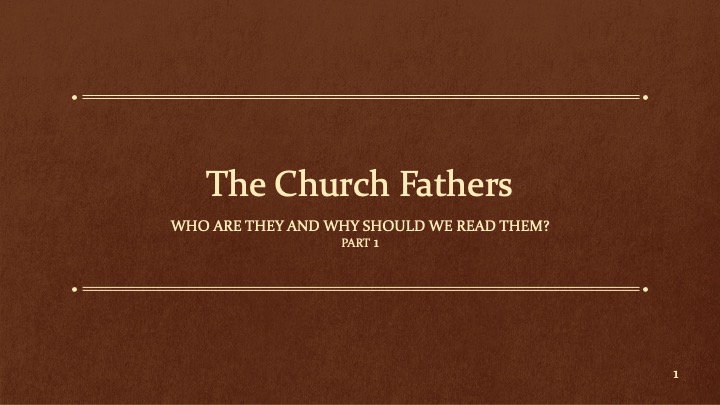
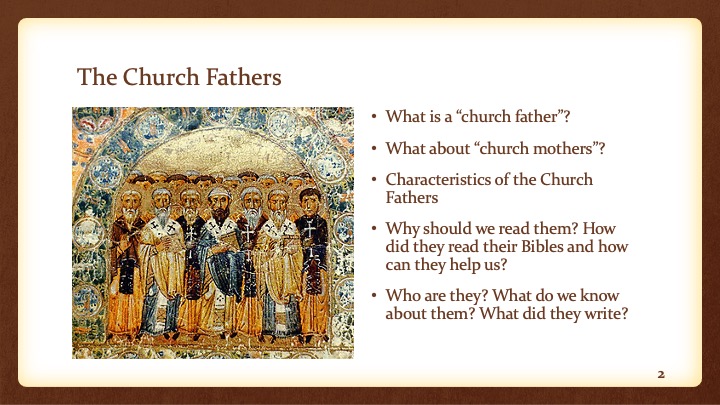
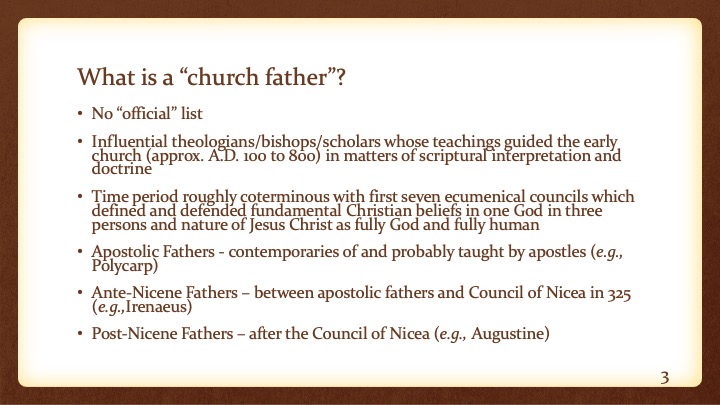
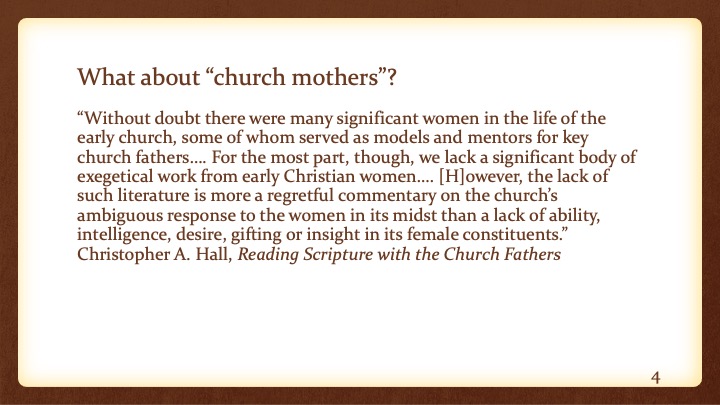
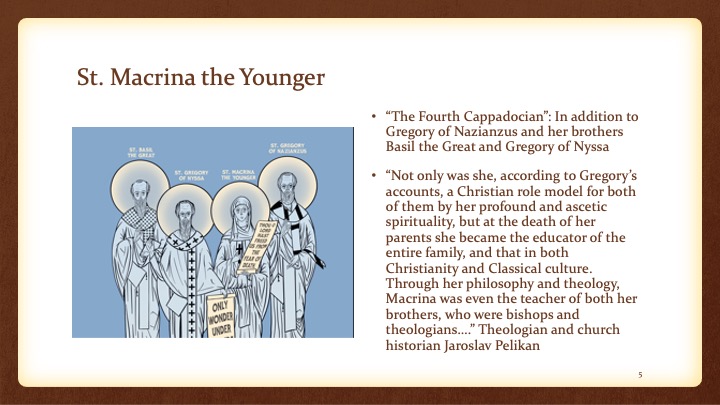
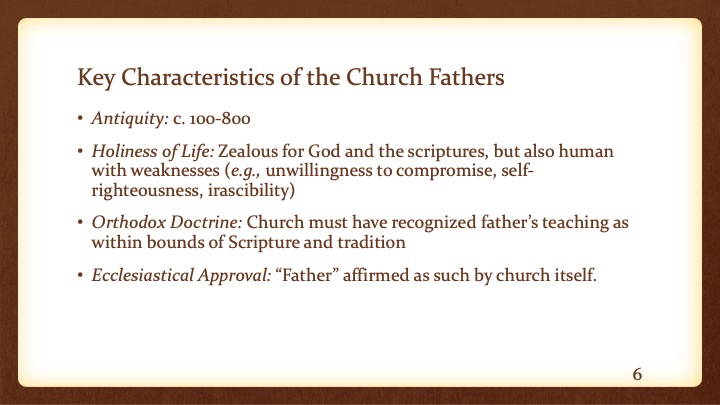
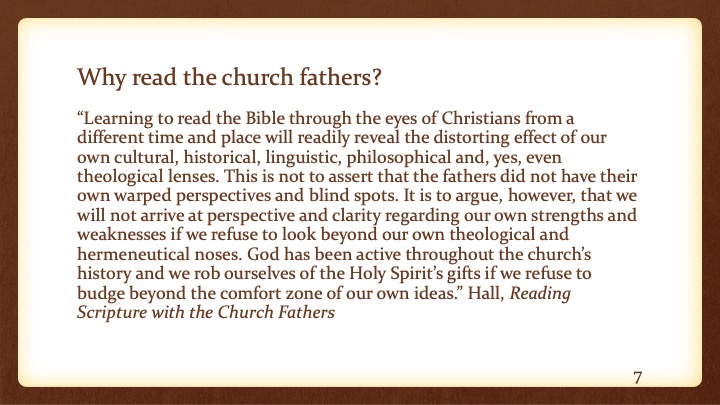
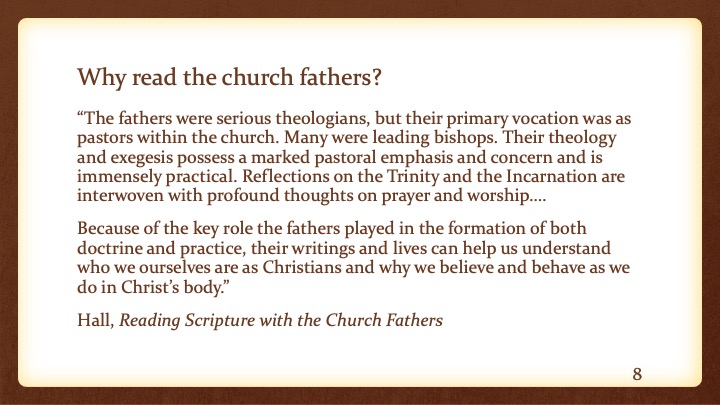
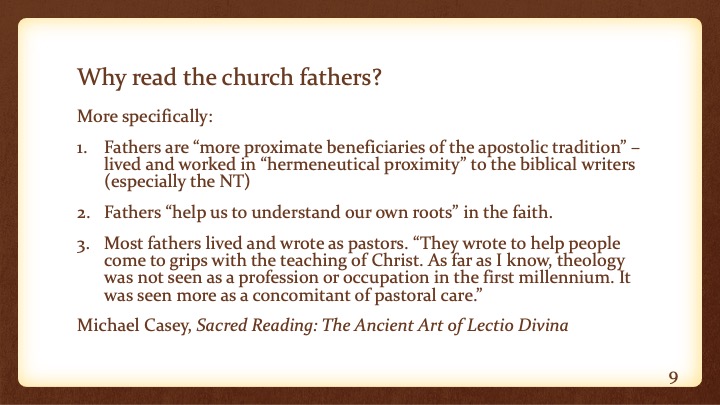
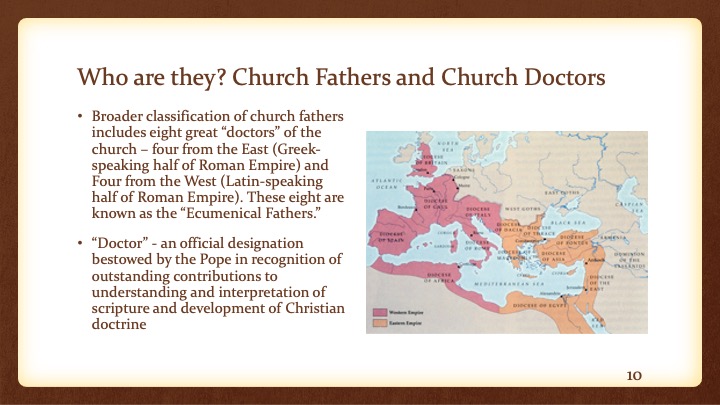
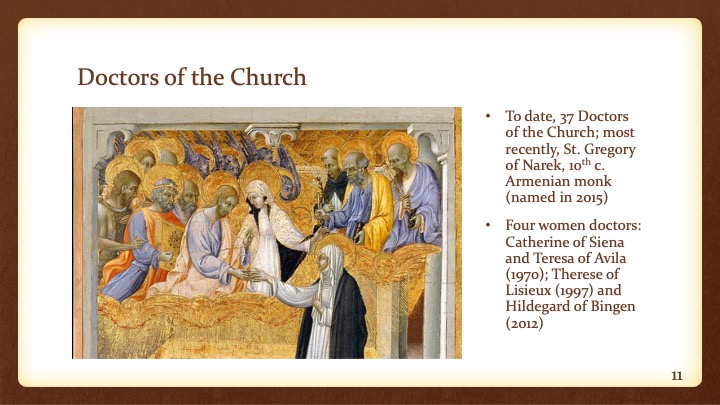
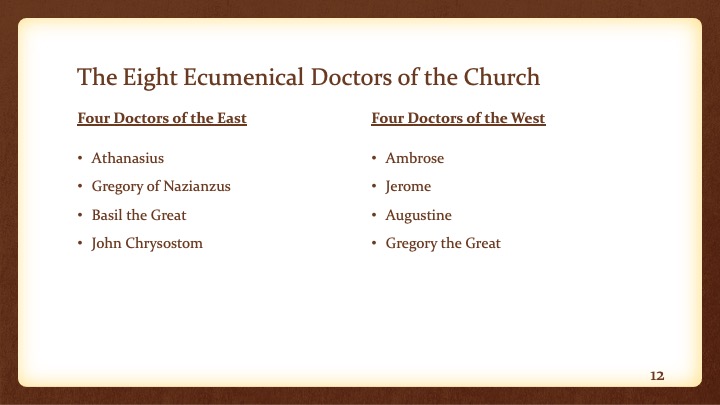
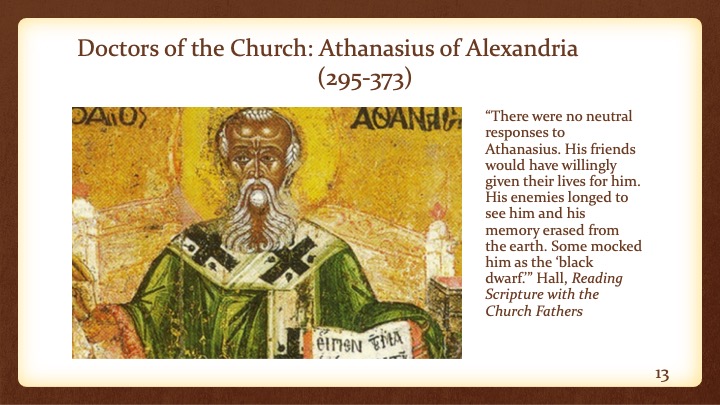
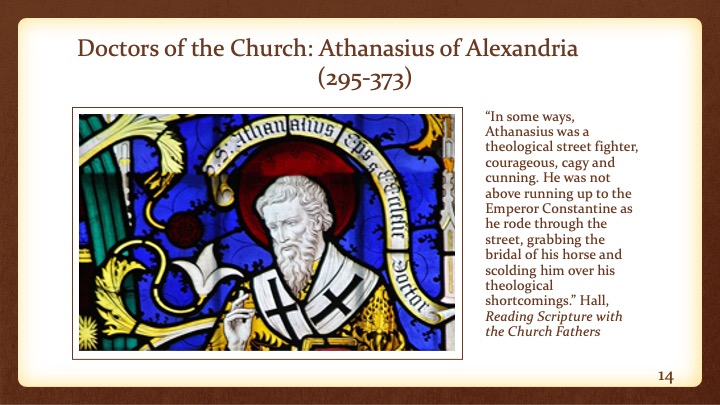
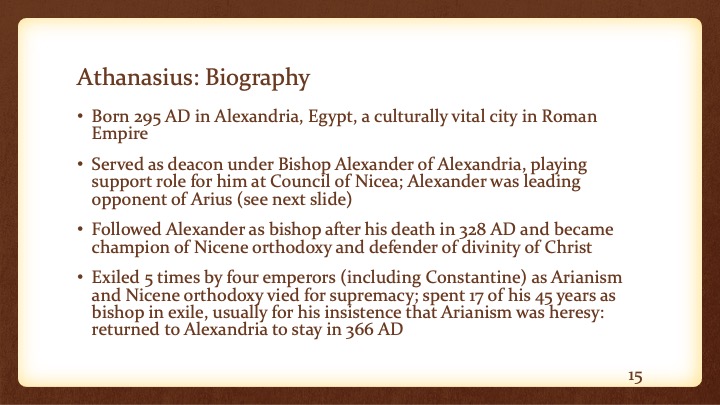
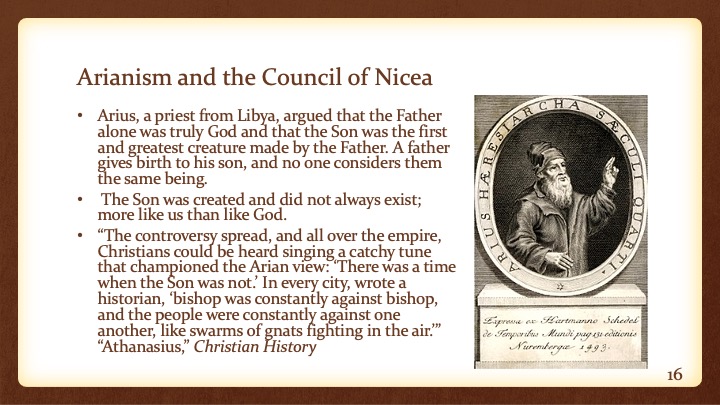
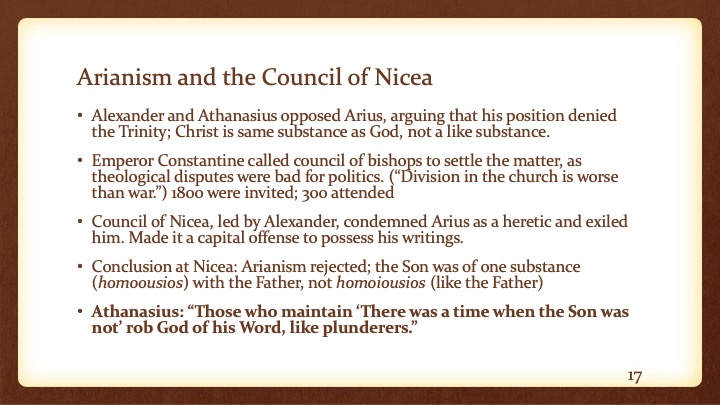

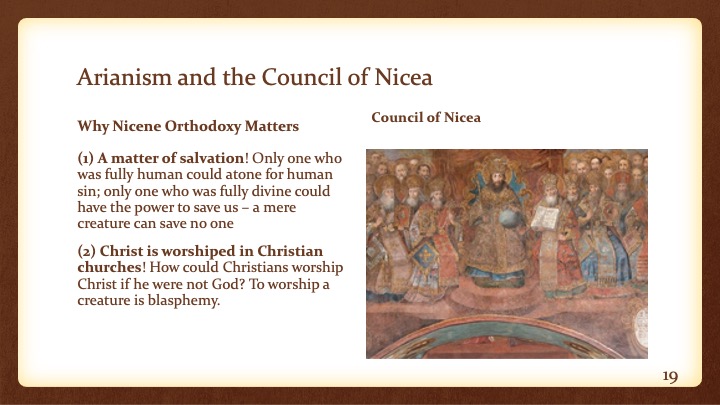
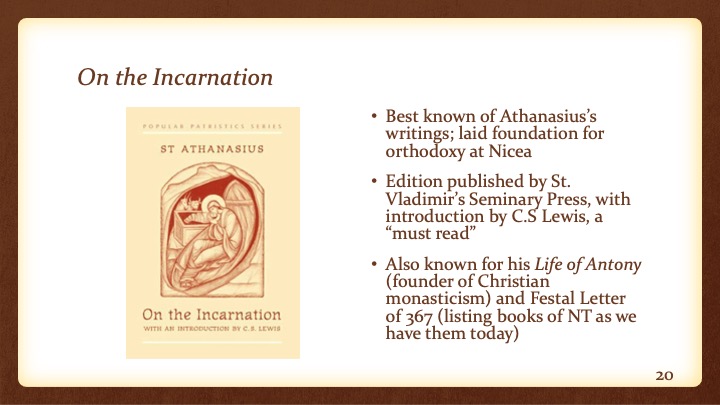
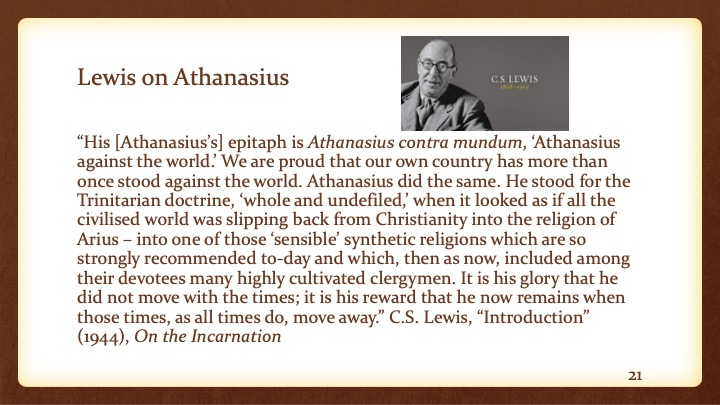
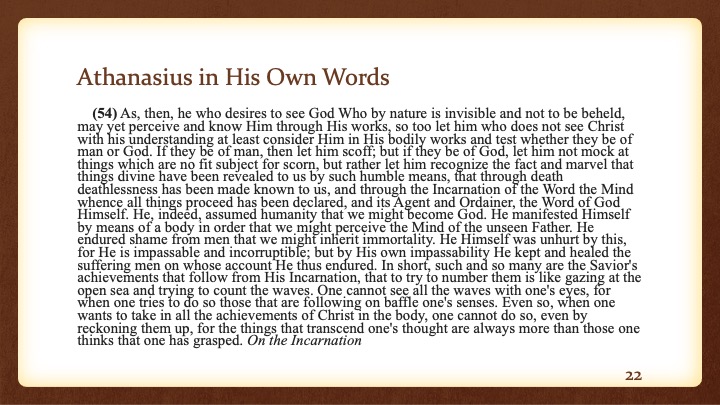
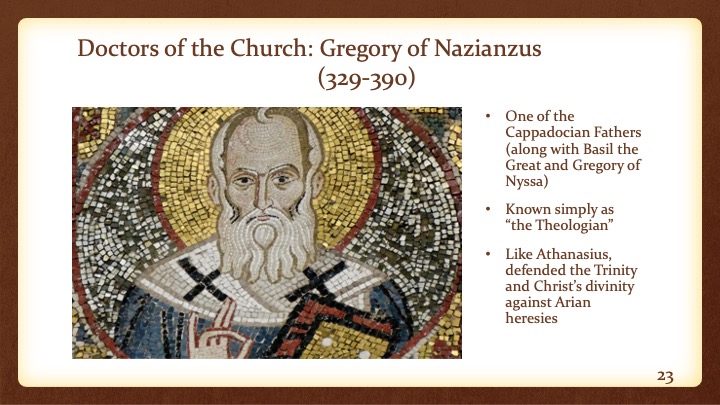
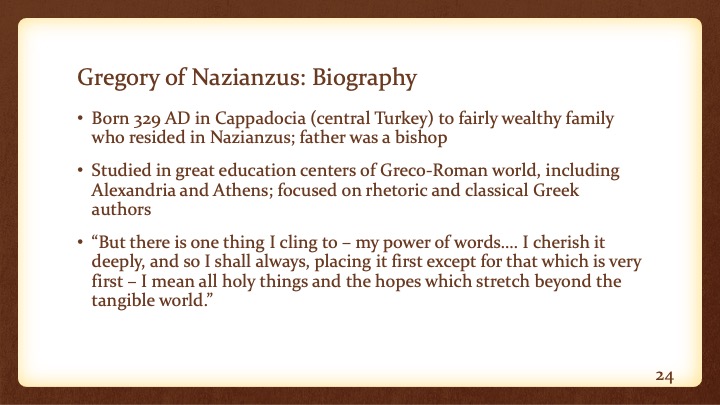
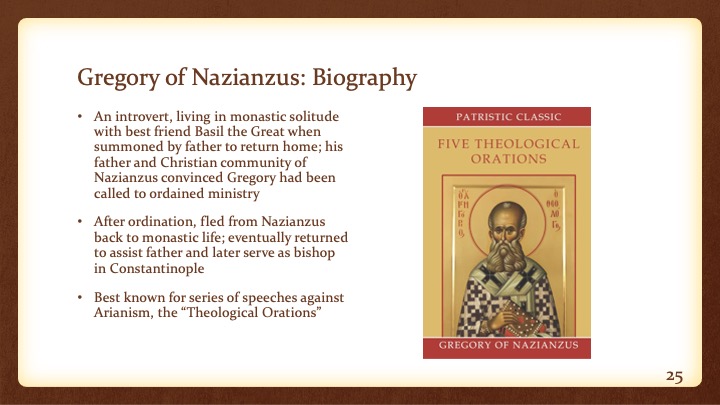
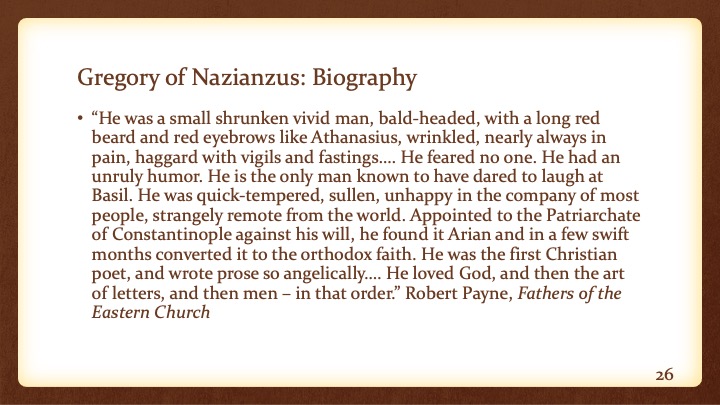
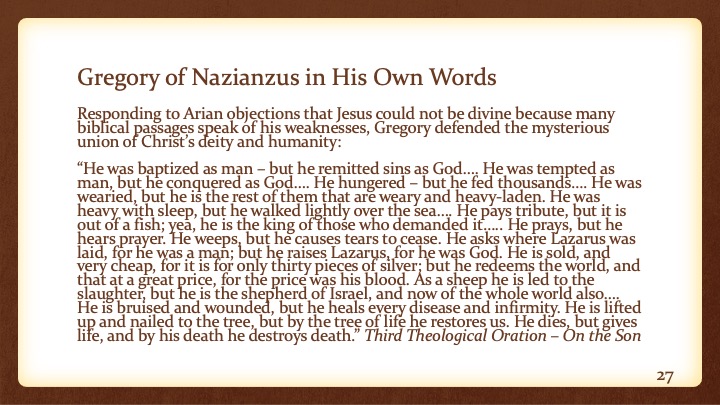
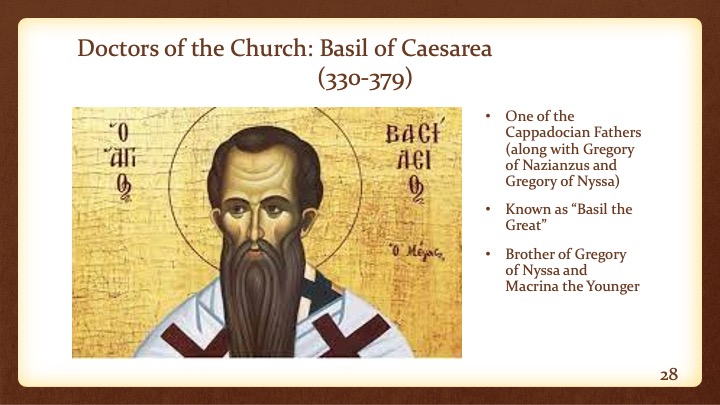
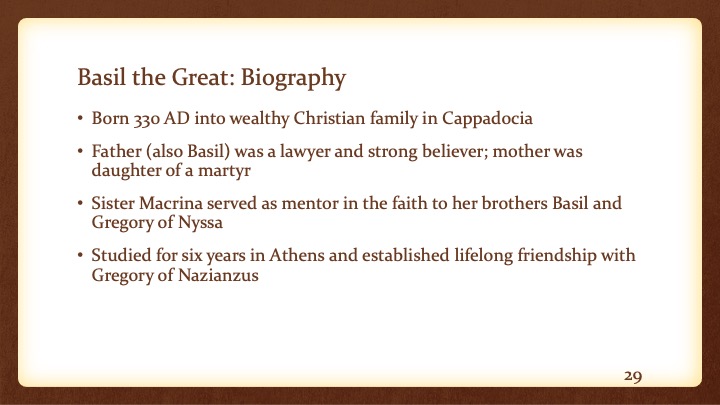
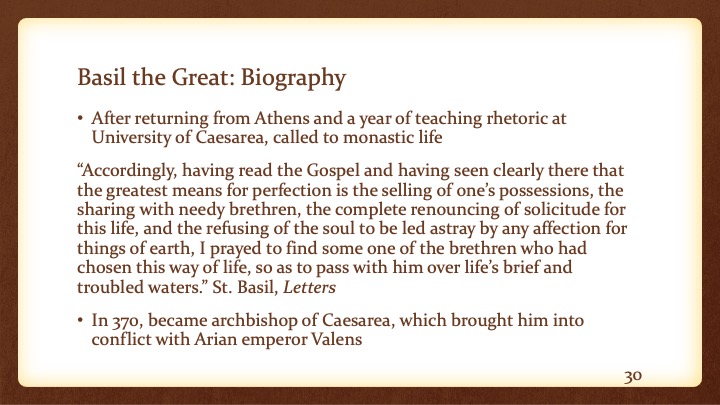
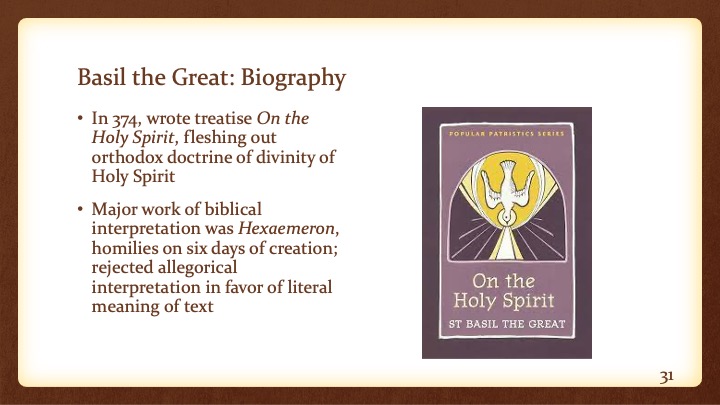
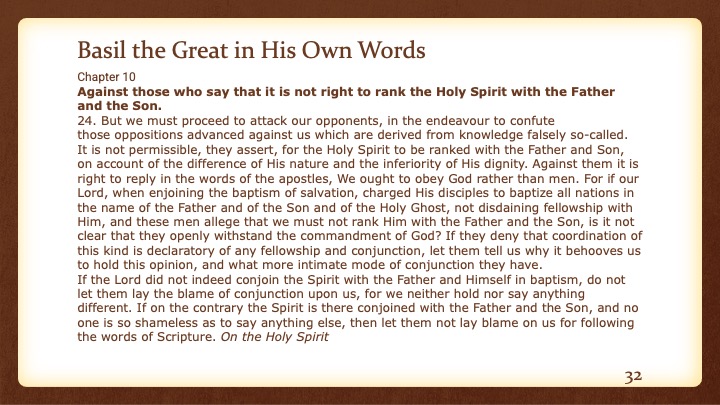
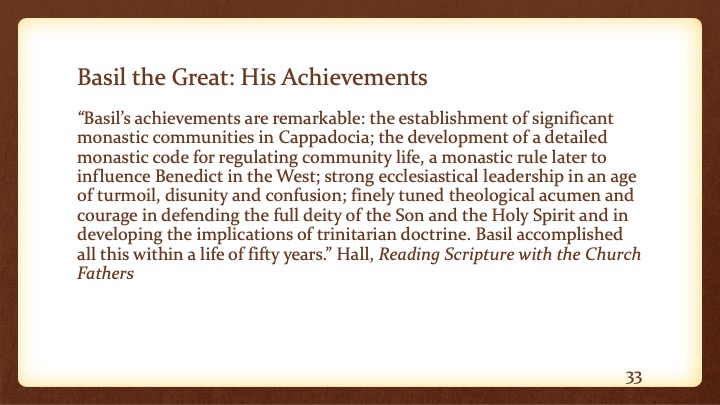
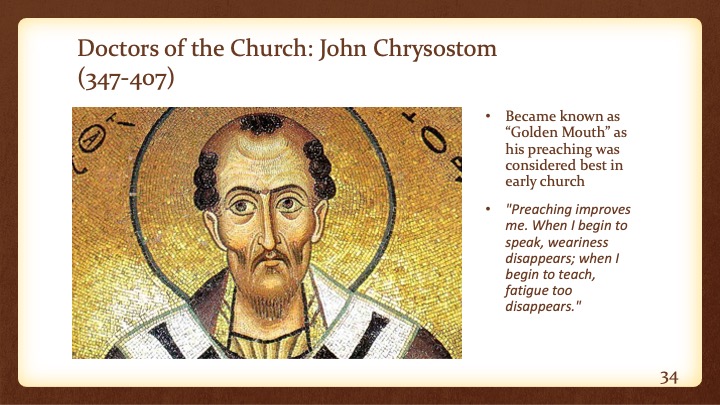
Church Fathers 1 Text
Church Fathers
Who Are They and Why Should we read them?
• What is a “church father”?
• What about “church mothers”?
• Characteristics of the Church Fathers
• Why should we read them? How did they read their Bibles and how can they help us?
• Who are they? What do we know about them? What did they write?
What is a “church father”?
• No “official” list
• Influential theologians/bishops/scholars whose teachings guided the early church (approx. A.D. 100 to 800) in matters of scriptural interpretation and doctrine
• Time period roughly coterminous with first seven ecumenical councils which defined and defended fundamental Christian beliefs in one God in three persons and nature of Jesus Christ as fully God and fully human
• Apostolic Fathers - contemporaries of and probably taught by apostles (e.g., Polycarp)
• Ante-Nicene Fathers – between apostolic fathers and Council of Nicea in 325 (e.g.,Irenaeus)
• Post-Nicene Fathers – after the Council of Nicea (e.g., Augustine)
What about “church mothers”?
“Without doubt there were many significant women in the life of the early church, some of whom served as models and mentors for key church fathers…. For the most part, though, we lack a significant body of exegetical work from early Christian women…. [H]owever, the lack of such literature is more a regretful commentary on the church’s ambiguous response to the women in its midst than a lack of ability, intelligence, desire, gifting or insight in its female constituents.” Christopher A. Hall, Reading Scripture with the Church Fathers
St. Macrina the Younger
• “The Fourth Cappadocian”: In addition to Gregory of Nazianzus and her brothers Basil the Great and Gregory of Nyssa
• “Not only was she, according to Gregory’s accounts, a Christian role model for both of them by her profound and ascetic spirituality, but at the death of her parents she became the educator of the entire family, and that in both Christianity and Classical culture. Through her philosophy and theology, Macrina was even the teacher of both her brothers, who were bishops and theologians….” Theologian and church historian Jaroslav Pelikan
Church Fathers
Key Characteristics of the Church Fathers
• Antiquity: c. 100-800
• Holiness of Life: Zealous for God and the scriptures, but also human with weaknesses (e.g., unwillingness to compromise, self-righteousness, irascibility)
• Orthodox Doctrine: Church must have recognized father’s teaching as within bounds of Scripture and tradition
• Ecclesiastical Approval: “Father” affirmed as such by church itself.
Why read the church fathers?
“Learning to read the Bible through the eyes of Christians from a different time and place will readily reveal the distorting effect of our own cultural, historical, linguistic, philosophical and, yes, even theological lenses. This is not to assert that the fathers did not have their own warped perspectives and blind spots. It is to argue, however, that we will not arrive at perspective and clarity regarding our own strengths and weaknesses if we refuse to look beyond our own theological and hermeneutical noses. God has been active throughout the church’s history and we rob ourselves of the Holy Spirit’s gifts if we refuse to budge beyond the comfort zone of our own ideas.” Hall, Reading Scripture with the Church Fathers
Why read the church fathers?
“The fathers were serious theologians, but their primary vocation was as pastors within the church. Many were leading bishops. Their theology and exegesis possess a marked pastoral emphasis and concern and is immensely practical. Reflections on the Trinity and the Incarnation are interwoven with profound thoughts on prayer and worship….
Because of the key role the fathers played in the formation of both doctrine and practice, their writings and lives can help us understand who we ourselves are as Christians and why we believe and behave as we do in Christ’s body.”
Hall, Reading Scripture with the Church Fathers
The Eight Ecumenical Doctors of the Church
Four Doctors of the East
• Athanasius
• Gregory of Nazianzus
• Basil the Great
• John Chrysostom
Four Doctors of the West
• Ambrose
• Jerome
• Augustine
• Gregory the Great
Church Fathers
Doctors of the Church: Athanasius of Alexandria
(295-373)
“There were no neutral responses to Athanasius. His friends would have willingly given their lives for him. His enemies longed to see him and his memory erased from the earth. Some mocked him as the ‘black dwarf.’” Hall, Reading Scripture with the Church Fathers
Athanasius: Biography
• Born 295 AD in Alexandria, Egypt, a culturally vital city in Roman Empire
• Served as deacon under Bishop Alexander of Alexandria, playing support role for him at Council of Nicea; Alexander was leading opponent of Arius (see next slide)
• Followed Alexander as bishop after his death in 328 AD and became champion of Nicene orthodoxy and defender of divinity of Christ
• Exiled 5 times by four emperors (including Constantine) as Arianism and Nicene orthodoxy vied for supremacy; spent 17 of his 45 years as bishop in exile, usually for his insistence that Arianism was heresy: returned to Alexandria to stay in 366 AD
Arianism and the Council of Nicea
• Arius, a priest from Libya, argued that the Father alone was truly God and that the Son was the first and greatest creature made by the Father. A father gives birth to his son, and no one considers them the same being.
• The Son was created and did not always exist; more like us than like God.
• “The controversy spread, and all over the empire, Christians could be heard singing a catchy tune that championed the Arian view: ‘There was a time when the Son was not.’ In every city, wrote a historian, ‘bishop was constantly against bishop, and the people were constantly against one another, like swarms of gnats fighting in the air.’” “Athanasius,” Christian History
• Alexander and Athanasius opposed Arius, arguing that his position denied the Trinity; Christ is same substance as God, not a like substance.
• Emperor Constantine called council of bishops to settle the matter, as theological disputes were bad for politics. (“Division in the church is worse than war.”) 1800 were invited; 300 attended
• Council of Nicea, led by Alexander, condemned Arius as a heretic and exiled him. Made it a capital offense to possess his writings.
• Conclusion at Nicea: Arianism rejected; the Son was of one substance (homoousios) with the Father, not homoiousios (like the Father)
• Athanasius: “Those who maintain ‘There was a time when the Son was not’ rob God of his Word, like plunderers.”
Church Fathers
The Nicene Creed
We believe in one God, the Father, the Almighty, maker of heaven and earth, of all that is, seen and unseen.
We believe in one Lord, Jesus Christ, the only Son of God, eternally begotten of the Father, God from God, Light from Light, true God from true God, begotten, not made, of one Being with the Father; through him all things were made. For us and for our salvation he came down from heaven, was incarnate of the Holy Spirit and the Virgin Mary and became truly human. For our sake he was crucified under Pontius Pilate; he suffered death and was buried. On the third day he rose again in accordance with the Scriptures; he ascended into heaven and is seated at the right hand of the Father. He will come again in glory to judge the living and the dead, and his kingdom will have no end.
We believe in the Holy Spirit, the Lord, the giver of life, who proceeds from the Father and the Son, who with the Father and the Son is worshiped and glorified, who has spoken through the prophets. We believe in one holy catholic and apostolic Church. We acknowledge one baptism for the forgiveness of sins. We look for the resurrection of the dead, and the life of the world to come. Amen.
Arianism and the Council of Nicea
Church Fathers
Why Nicene Orthodoxy Matters
(1) A matter of salvation! Only one who was fully human could atone for human sin; only one who was fully divine could have the power to save us – a mere creature can save no one
(2) Christ is worshiped in Christian churches! How could Christians worship Christ if he were not God? To worship a creature is blasphemy.
On the Incarnation
• Best known of Athanasius’s writings; laid foundation for orthodoxy at Nicea
• Edition published by St. Vladimir’s Seminary Press, with introduction by C.S Lewis, a “must read”
• Also known for his Life of Antony (founder of Christian monasticism) and Festal Letter of 367 (listing books of NT as we have them today)
Lewis on Athanasius
“His [Athanasius’s] epitaph is Athanasius contra mundum, ‘Athanasius against the world.’ We are proud that our own country has more than once stood against the world. Athanasius did the same. He stood for the Trinitarian doctrine, ‘whole and undefiled,’ when it looked as if all the civilised world was slipping back from Christianity into the religion of Arius – into one of those ‘sensible’ synthetic religions which are so strongly recommended to-day and which, then as now, included among their devotees many highly cultivated clergymen. It is his glory that he did not move with the times; it is his reward that he now remains when those times, as all times do, move away.” C.S. Lewis, “Introduction” (1944), On the Incarnation
Church Fathers
Gregory of Nazianzus: Biography
• Born 329 AD in Cappadocia (central Turkey) to fairly wealthy family who resided in Nazianzus; father was a bishop
• Studied in great education centers of Greco-Roman world, including Alexandria and Athens; focused on rhetoric and classical Greek authors
• “But there is one thing I cling to – my power of words…. I cherish it deeply, and so I shall always, placing it first except for that which is very first – I mean all holy things and the hopes which stretch beyond the tangible world.”
• An introvert, living in monastic solitude with best friend Basil the Great when summoned by father to return home; his father and Christian community of Nazianzus convinced Gregory had been called to ordained ministry
• After ordination, fled from Nazianzus back to monastic life; eventually returned to assist father and later serve as bishop in Constantinople
• Best known for series of speeches against Arianism, the “Theological Orations”
• “He was a small shrunken vivid man, bald-headed, with a long red beard and red eyebrows like Athanasius, wrinkled, nearly always in pain, haggard with vigils and fastings…. He feared no one. He had an unruly humor. He is the only man known to have dared to laugh at Basil. He was quick-tempered, sullen, unhappy in the company of most people, strangely remote from the world. Appointed to the Patriarchate of Constantinople against his will, he found it Arian and in a few swift months converted it to the orthodox faith. He was the first Christian poet, and wrote prose so angelically…. He loved God, and then the art of letters, and then men – in that order.” Robert Payne, Fathers of the Eastern Church
Gregory of Nazianzus in His Own Words
Responding to Arian objections that Jesus could not be divine because many biblical passages speak of his weaknesses, Gregory defended the mysterious union of Christ’s deity and humanity:
“He was baptized as man – but he remitted sins as God…. He was tempted as man, but he conquered as God…. He hungered – but he fed thousands…. He was wearied, but he is the rest of them that are weary and heavy-laden. He was heavy with sleep, but he walked lightly over the sea…. He pays tribute, but it is out of a fish; yea, he is the king of those who demanded it….. He prays, but he hears prayer. He weeps, but he causes tears to cease. He asks where Lazarus was laid, for he was a man; but he raises Lazarus, for he was God. He is sold, and very cheap, for it is for only thirty pieces of silver; but he redeems the world, and that at a great price, for the price was his blood. As a sheep he is led to the slaughter, but he is the shepherd of Israel, and now of the whole world also…. He is bruised and wounded, but he heals every disease and infirmity. He is lifted up and nailed to the tree, but by the tree of life he restores us. He dies, but gives life, and by his death he destroys death.” Third Theological Oration – On the Son
Church Fathers
Doctors of the Church: Basil of Caesarea
(330-379)
• One of the Cappadocian Fathers (along with Gregory of Nazianzus and Gregory of Nyssa)
• Known as “Basil the Great”
• Brother of Gregory of Nyssa and Macrina the Younger
Basil the Great: Biography
• Born 330 AD into wealthy Christian family in Cappadocia
• Father (also Basil) was a lawyer and strong believer; mother was daughter of a martyr
• Sister Macrina served as mentor in the faith to her brothers Basil and Gregory of Nyssa
• Studied for six years in Athens and established lifelong friendship with Gregory of Nazianzus
Basil the Great: Biography
• After returning from Athens and a year of teaching rhetoric at University of Caesarea, called to monastic life
“Accordingly, having read the Gospel and having seen clearly there that the greatest means for perfection is the selling of one’s possessions, the sharing with needy brethren, the complete renouncing of solicitude for this life, and the refusing of the soul to be led astray by any affection for things of earth, I prayed to find some one of the brethren who had chosen this way of life, so as to pass with him over life’s brief and troubled waters.” St. Basil, Letters
• In 370, became archbishop of Caesarea, which brought him into conflict with Arian emperor Valens
• In 374, wrote treatise On the Holy Spirit, fleshing out orthodox doctrine of divinity of Holy Spirit
• Major work of biblical interpretation was Hexaemeron, homilies on six days of creation; rejected allegorical interpretation in favor of literal meaning of text
Basil the Great in His Own Words
Chapter 10
Against those who say that it is not right to rank the Holy Spirit with the Father and the Son.
24. But we must proceed to attack our opponents, in the endeavor to confute those oppositions advanced against us which are derived from knowledge falsely so-called.
It is not permissible, they assert, for the Holy Spirit to be ranked with the Father and Son, on account of the difference of His nature and the inferiority of His dignity. Against them it is right to reply in the words of the apostles, We ought to obey God rather than men. For if our Lord, when enjoining the baptism of salvation, charged His disciples to baptize all nations in the name of the Father and of the Son and of the Holy Ghost, not disdaining fellowship with Him, and these men allege that we must not rank Him with the Father and the Son, is it not clear that they openly withstand the commandment of God? If they deny that coordination of this kind is declaratory of any fellowship and conjunction, let them tell us why it behooves us to hold this opinion, and what more intimate mode of conjunction they have.
If the Lord did not indeed conjoin the Spirit with the Father and Himself in baptism, do not let them lay the blame of conjunction upon us, for we neither hold nor say anything different. If on the contrary the Spirit is there conjoined with the Father and the Son, and no one is so shameless as to say anything else, then let them not lay blame on us for following the words of Scripture. On the Holy Spirit
Basil the Great: His Achievements
“Basil’s achievements are remarkable: the establishment of significant monastic communities in Cappadocia; the development of a detailed monastic code for regulating community life, a monastic rule later to influence Benedict in the West; strong ecclesiastical leadership in an age of turmoil, disunity and confusion; finely tuned theological acumen and courage in defending the full deity of the Son and the Holy Spirit and in developing the implications of trinitarian doctrine. Basil accomplished all this within a life of fifty years.” Hall, Reading Scripture with the Church Fathers
Church Fathers
Doctors of the Church: John Chrysostom (347-407)
• Became known as “Golden Mouth” as his preaching was considered best in early church
• "Preaching improves me. When I begin to speak, weariness disappears; when I begin to teach, fatigue too disappears."
John Chrysostom: Biography
• Born in 347 AD; raised in Antioch, Syria, a leading intellectual center
• Brought up in spiritually divided household; father was a Roman official, mother was a strong Christian; father died when John was an infant, mother devoted herself to him
• Called by God to monastic life (widowed mom less than enthusiastic about this, but went anyway)
• Harsh ascetic life in mountains above Antioch damaged his health; took Lord’s command to “be watchful” too literally
• “He retired to a cave, denied himself sleep, read the Bible continually and spent two years without lying down, apparently in the belief that a Christian must stand in order to obey the injunction: ‘Be ye watchful.’ The result was inevitable. His stomach shriveled up, and his kidneys were damaged by cold. His digestion permanently impaired, unable to doctor himself, he came down the mountain, walked to Antioch and appeared before Archbishop Meletius, who immediately sent him to a doctor.” Payne, Fathers of the Eastern Church
• Served as deacon and then presbyter at church in Antioch
• Preaching came to be noticed after “Affair of the Statues” in 388 AD
John Chrysostom: The Affair of the Statues
• After emperor announced increase in taxes, statues of him and his family were desecrated; city leaders were punished; some were executed
• Archbishop Flavian went to Constantinople to plead for clemency; John preached in Flavian’s absence
• Believed desire for luxury caused rebellion; if gold taken from people, so what? They’d just spend it on the theater, dancing girls, and horse races!
• In series of sermons “On the Statues,” spoke of God’s mercy and called for true transformation: “Improve yourselves now truly, not as when during one of the numerous earthquakes or in famine or drought or in similar visitations you leave off your sinning for three or four days and then begin the old life again.… Stop evil slandering, harbor no enmities, and give up the wicked custom of frivolous cursing and swearing. If you do this, you will surely be delivered from the present distress and attain eternal happiness.”
• No one should fear death at the hands of the emperor. Have faith in Christ and in his servant Flavian:
"I tell you, God will not suffer this errand to be fruitless. The very sight of the venerable bishop will dispose the emperor to mercy. This is the holy season. In such a season, Flavian will show the emperor the blessedness of forgiving sins, for this is the season when we remember how Christ died for the sins of the world.... Let us supplicate; let us make an embassy to the king who reigns above, an embassy of tears.“
• When Flavian returned with news of emperor’s pardon, John’s reputation soared
John Chrysostom: Biography
• In 398, kidnapped to Constantinople; seized by soldiers and taken to capital of empire to become archbishop; government officials wanted the best!
• John accepted this as God’s providence
• Did not soften his words when preaching to audience which included imperial household; railed against abuses of wealth and power; gave his own household budget to care for the poor and build hospitals
• Lack of tact and political skills led to his being deposed and sent into exile (404-07); wrote over 200 letters to friends; died after 3 years
• 34 years later, Emperor Theodosius II publicly asked forgiveness for sins of his parents, who had exiled John; his relics brought back to Constantinople
John Chrysostom: His Sermons
• 600 have survived
• Lasted from ½ hour to 2 hours
• Began them with a prayer that many Christians still pray each Sunday: “Almighty God, unto whom all hearts are open, all desires known, and from whom no secrets are hid; cleanse the thoughts of our hearts by the inspiration of your Holy Spirit, that we may perfectly love you, and worthily magnify your holy name, through Christ, our Lord.”
• Were well attended, but sometimes John became discouraged: “My work is like that of a man who is trying to clean a piece of ground into which a muddy stream is constantly flowing.”
• Doctrine and sound living inseparable; what we know must affect how we live
Gluttony and abuse of wealth: “It is foolishness and a public madness to fill the cupboards with clothing and allow men who are created in God’s image and our likeness to stand naked and trembling with the cold so that they can hardly hold themselves upright.… You are large and fat, you hold drinking parties until late at night, and sleep in a warm, soft bed. And do you not think of how you must give an account of your misuse of the gifts of God?”
Sexual temptation: “If you see a shameless woman in the theater, who treads the stage with uncovered head and bold attitudes, dressed in garments adorned with gold, flaunting her soft sensuality, singing immoral songs, throwing her limbs about in the dance, and making shameless speeches … do you still dare to say that nothing human happens to you then? Long after the theater is closed and everyone is gone away, those images still float before your soul, their words, their conduct, their glances, their walk, their positions, their excitation, their unchaste limbs—and as for you, you go home covered with a thousand wounds! But not alone—the whore goes with you—although not openly and visibly … but in your heart, and in your conscience, and there within you she kindles the Babylonian furnace … in which the peace of your home, the purity of your heart, the happiness of your marriage will be burnt up!”
Abortion: “Why do you sow where the field is eager to destroy the fruit? Where there are medicines of sterility? Where there is murder before birth? You do not even let a harlot remain only a harlot, but you make her a murderess as well. Indeed, it is something worse than murder, and I do not know what to call it; for she does not kill what is formed, but prevents its formation. What then? Do you condemn the gifts of God, and fight with His laws? What is a curse, do you seek as though it were a blessing? Do you make the anteroom of slaughter? Do you teach the women who are given to you for procreation of offspring to perpetuate killing?